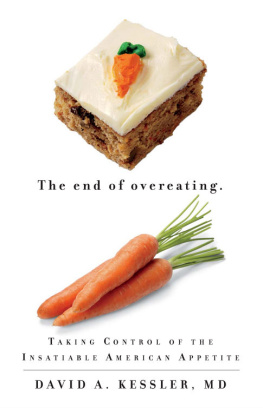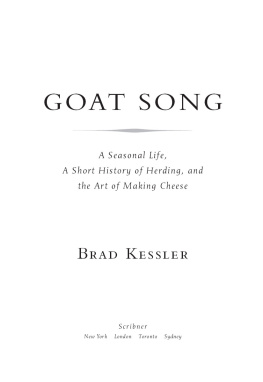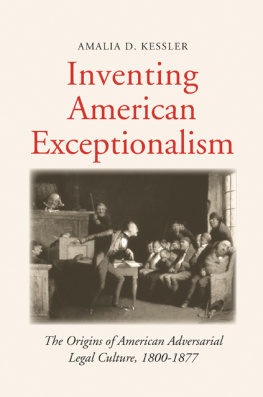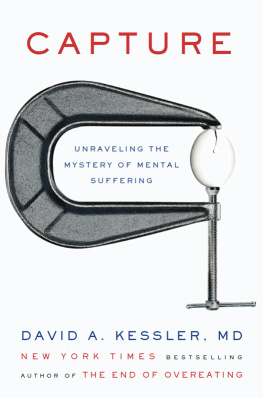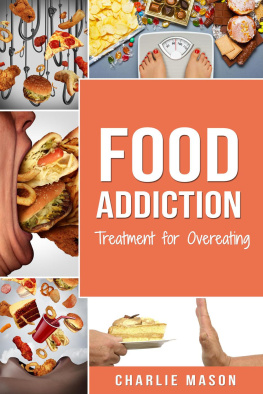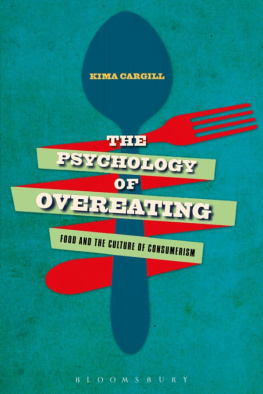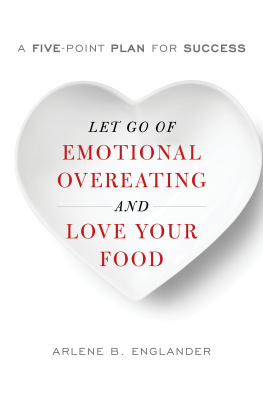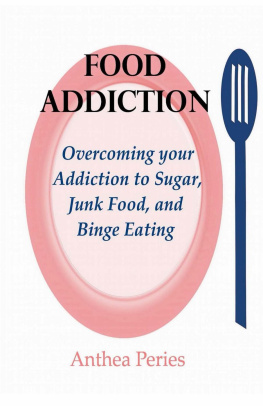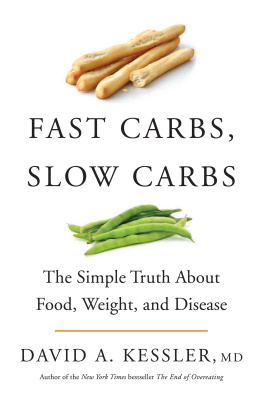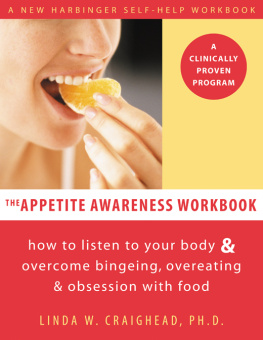Ive learned to recognize overeating in restaurants all over America. Its not hard, because people who have been conditioned to overeat behave distinctively. They attack their food with a special kind of gusto. Ive seen them lift their forks, readying their next bite before theyve swallowed the previous one, and Ive watched as they reach across the table to spear a companions french fries or the last morsel of someone elses dessert. Certain foods seem to exert a magical pull on them, and they rarely leave any on their plates.
As I watch this kind of impulsive behavior, I suspect a battle may be taking place in their heads, the struggle between I want and I shouldnt, between Im in charge and I cant control this. In this struggle lies one of the most consequential battles we face to protect our health.

The End of Overeating was born as I watched The Oprah WinfreyShow. Dr. Phil, the programs former resident psychologist, was talking about why people are obese and what they have to do to lose weight.
When he asked for a volunteer from the audience, a large, well-dressed woman named Sarah came forward. Resting his hand on her shoulder, Dr. Phil asked Sarah to talk candidly about the self-defeating behavior that, he insisted, led to weight gain. He said he wanted to know what made her do what you know you dont want to do.
At first Sarah was all smiles as she told her story. I eat all the time, she said with a nervous giggle. I eat when Im hungry, I eat when Im not hungry. I eat to celebrate, I eat when Im sad. I eat at night. I eat when my husband comes home.
Dr. Phil pressed Sarah to describe how she felt about herself. The sunny visage began to change as she confessed to feeling like a failure. Sarah called herself fat and ugly and said her actions often left her disappointed, frustrated, and angry. I feel that I cant accomplish what I set up my mind to do. I feel that I cant do it, that I dont have the willpower.
Choking back tears, she described how her focus sometimes turned obsessively to her eating behaviors. My whole thought is about why I eat, what I eat, when I eat, with whom I eat, she said. I dont like myself.
Turning to the audience, Dr. Phil asked, How many of you here related to something you heard? About two-thirds of its members raised their hands.
Sarahs struggle obviously struck a familiar chord in a lot of people. In fact, it struck one in me.

One afternoon, I decided to conduct an experiment that pitted temptation against willpower.
I walked into a bakery in San Francisco and asked for two semisweet chocolate-chip cookies. Back home, I pulled the cookies out of their bag and placed them on a paper plate, just beyond my arms reach. They were thick and gooeychunks of chocolate filled the craters of the cookies and rose into peaks.
I focused my attention on them, monitoring my own response. I sighed deeply and bit my lower lip. Almost indifferent to the flowers on the table and even to the framed photos of my children on the counter, I was fixated on those cookies until I forced myself to pull away. At some point, I noticed that I had moved my right hand a few inches closer to them, but I had no conscious recollection of my decision to act. I tried to concentrate on reading the newspaper, but I kept glancing back to the plate.
Feeling vaguely uneasy, I headed to my upstairs office, which is about as far away from the kitchen as I can get. But even from that safe distance, I could not fully shake the image of the cookies. Eventually, I left the house without having eaten them, and I felt triumphant.
Hours later, I headed to Caff Greco, a North Beach institution where the cappuccino is said to be the best in the city. A large glass jar filled with homemade cookies sat on the counter.
I ordered an orange-chocolate cookie and ate it at once.

I set out to understand what is driving these kinds of behaviors. I wanted to know why Sarah couldnt stop eating, even though doing so made her miserably unhappy and jeopardized her health. I wanted to know why my determination could so easily collapse.
I was intent on learning what could be done to help Sarah, me, and the millions of people just like us.
I began to listen more closely to people struggling with weight problems, listening the way a doctor needs to listen. I watched as well, paying close attention to how they behaved around food. It soon became clear that Sarah was not alone.
My conversation with a journalist, a forty-year-old man Ill call Andrew, reminded me that the struggle respects neither gender, nor socioeconomic class, nor age. Andrew, who is about five feet nine inches tall and weighs about 245 pounds, has written fearlessly from many of the worlds battlegrounds. He has spent time with jihadists, suicide bombers, and war-hardened soldiers, and he hasnt flinched. But when I placed M&Ms on the table before him, Andrew felt barely able to cope.
When Im in a meeting or interviewing someone and there is food on the table, Ill spend half my time thinking about that food, he admitted. His internal dialogue seesaws between Man, that looks good, I could eat that, and Im not going to eat that because I dont need it.
His conflict begins early in the day and never lets up. I wake up in the morning knowing that food is my enemy and that I am my own enemy, he observed. Its uncontrollable.
At lunch Andrew is likely to be tempted by a basket of hot, fresh bread served with butter. On city streets Starbucks seems to summon him, and at home his refrigerator beckons irresistibly. It just goes on and on and on, said Andrew. Like so many people who have difficulty controlling their eating, he sees food as an obstacle course he must navigate.
Andrew finds pharmacies and convenience stores particularly challenging: If he manages to get past the candy aisle without succumbing, he has to stare down more candy at the checkout. In a typical tug-of-war Andrew will pick up candy, put it down, then pick it up again, over and over and over. Sometimes hell win his battle to get out the door without buying the candy; sometimes he wont. If he does make the purchase, he often feels so disgusted with himself that hell pour half the contents into the trashand then polish off the rest.
He described what he calls his food soundtrack. When I finished my bowl of Wheaties today, I immediately thought, Let me bring a banana and an apple to work so Im not tempted, so I dont eat that corn muffin downstairs at the office.
But any success is momentary and is quickly replaced by further thoughts of food. I talk to myself, he said. Ill ask, What am I going to eat for lunch? What if I get hungry at three? What are we having for dinner? I hope its good.
On a successful day, using maximum restraint, Andrew will consume about 1,500 calories, which is what he wants to eat in order to lose weight. But the next day he may consume 5,000. He rarely knows when hes full and feels mystified by people who dont share his single-mindedness.

